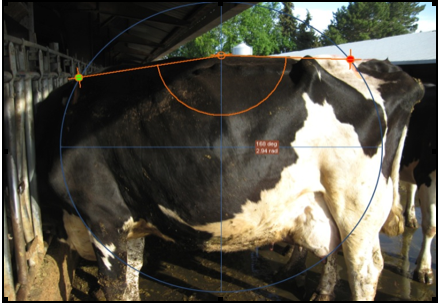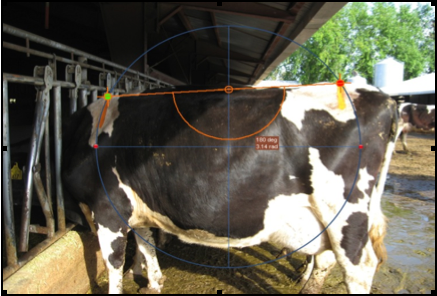Entry, Abstracts
Carlie Gordon, Washington State University
Background: Visual observation of an arched back in dairy cattle while they are standing and walking is one criterion for assessing lameness through locomotion scoring. However, observation of a back arch while cows are in stanchions is only variably associated with lameness. If the observation of back arch could be better defined, the sensitivity of this method might be improved. It was the purpose of this study to evaluate the degree of back arch that would differentiate lame from non-lame cows while in stanchions and assess if the back arch posture in the lock-up is a predictable observation for lameness.  This picture is showing a cow in lock up with an arched (concave) back. The cow in this picture has a back arch of 168 °, a deviation of 12° from a flat back as indicated by the orange line across her back.
This picture is showing a cow in lock up with an arched (concave) back. The cow in this picture has a back arch of 168 °, a deviation of 12° from a flat back as indicated by the orange line across her back.
Methods: Locomotion scores were collected for all lactating Holstein cows on one farm. Cows with scores of two or greater were used for this study. Eighteen cows received a locomotion score of ≥ 3 and 55 cows received a locomotion score of ≤ 2. Digital photographs of these cows while in stanchions and from videos as they exited the milking parlor were taken. Images were analyzed for the degree of back arch, “deviation from flat”, where a flat back was considered 180°. In addition, cows in one pen were observed 5 successive times while stanchioned to evaluate time in lockup effects on the presence of a back arch.
Results: The angle of deviation from cows during lockup was not associated with locomotion score. However, there was a trend for cows that were determined to have a locomotion score of ≥ 3 to have back angles that deviated further from 180 °. From the successive observations, back-arch was not a consistent observation but the proportion of observation time a cow was observed with a back arch was significantly greater for lame cows vs. non lame cows.  This picture is showing another cow in lockup. This cow has a straight back measuring 180 ° as indicated by the orange line across her back.
This picture is showing another cow in lockup. This cow has a straight back measuring 180 ° as indicated by the orange line across her back.
Conclusions: Our results indicate that the back arch observation, although inconsistently associated with locomotion scoring, could be used as a simple screening tool by veterinarians and dairy producers if frequent observations are made while the cows are stanchioned.
*Note: An organge paint stick was used to mark the withers and tail-head of each cow, pictures of each cow in lockup were then taken and at a later date a program called vistametrix was used to assess the the angle of each cow’s back
 Sunday, September 22, 2013 at 12:00PM
Sunday, September 22, 2013 at 12:00PM 
 EPDC,
EPDC,  NAVLE,
NAVLE,  scholarship in
scholarship in  Scholarships
Scholarships 




